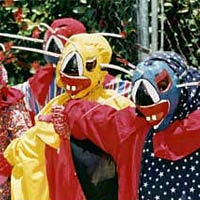
Vejigante masks have horns made of wood and coconut |
Festivities of St. James, the Apostle,
Held at the Town of Loíza in Puerto Rico
At the town of Loíza in northeastern Puerto
Rico, traditional activities honoring St. James manifest a mix of
indigenous, African and Hispanic cultures, but the African elements
are the most notable. The 10-day celebration is an expression of an
alienated, sometimes clandestine, culture, rooted in the centuries'
old mistreatment of blacks that have lived in the area. First
settled in the 1500s, the town became home to a large number of
African slaves brought to work in the sugarcane fields. Even today,
Loíza is known as a predominately Afro-Puerto Rican town.
St. James, the Apostle, originally earned the
devotion of Spaniards by aiding them in their struggle against the
invading Muslims centuries ago. It is said that St. James scared
off the enemy by disguising his troops as vejigantes, the
origin of the peculiar costumes used today in the festivities. The
costumes represent giants with long, horned African masks. Puerto
Rico's first conquerors and the Spanish clergy who accompanied them
to "evangelize the pagan natives" invoked St. James, the Apostle,
as their patron to protect them from the neighboring Indians (Caribs) and the European pirates that attacked the
island.
Once evangelized, the conquered Indians, and later
the black slaves, also called on St. James, to relieve their
oppression and suffering. St. James, not unlike Changó , a warrior god in the African Yoruba
tradition, carried an iron sword in his hand. The holy warrior
became popular with all three cultures -- the native, the African,
the Hispanic -- and the celebration's symbolism and traditions
became mixed. But the Spaniards no longer determined the festival's
rhythm and style. The people declared themselves loyal to their
patron-warrior, and turned him into a symbol of defiance in the
face of oppression. St. James became a further symbol of defiance
when during the 19th century the Church, yielding to pressure by
newly arrived Irish families, declared St. Patrick to be the town's
official saint. The townspeople considered St. Patrick the
oppressor's protector, an imposed "foreign" patron saint. Thus,
today's festival of St. James recalls memories of suffering and
struggle against foreign peoples and foreign values. By giving him
homage, the people believe, they and their lands receive God's
blessing.
In today's celebration, a parade of masks carved from
wood and coconuts is featured. The masks may represent a deity, an
ancestor, an animal, or a mythological or historical character.
Even this parade is not without "oppression"; in 1984, a municipal
order entitled "Public Order on Religion and Morality" was
published, defining the correct way a loiceño (native
of Loízo) must carry on religious processions and prescribing
the correct costumes, meeting resistance from the loiceños.
The festival has changed in recent years from a
festival being held only for the loiceños to a
commercial tourist attraction drawing spectators from throughout
Puerto Rico and beyond. Attracted by Loíza's beauty and its
beaches, outside investors are proposing to build hotel complexes,
condominiums and country clubs, threatening to displace or destroy
this historic Puerto Rican community. Once again, those native to
the town and its traditions are struggling against a foreign
culture being imposed on them, which makes the St. James
festivities all the more meaningful.
The project is documented with a 10-page report and
eight 8 x 10 color photographs.
Originally submitted by: Carlos Romero-Barcelo, Delegate (At Large).
 More Local Legacies... More Local Legacies... |
|
|
|
The Local Legacies project provides a "snapshot" of American Culture as it was expressed in spring of 2000. Consequently, it is not being updated with new or revised information with the exception of "Related Website" links.
|